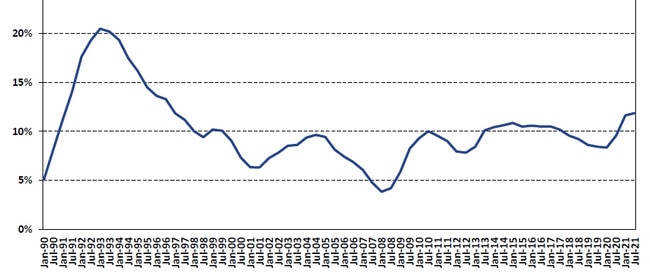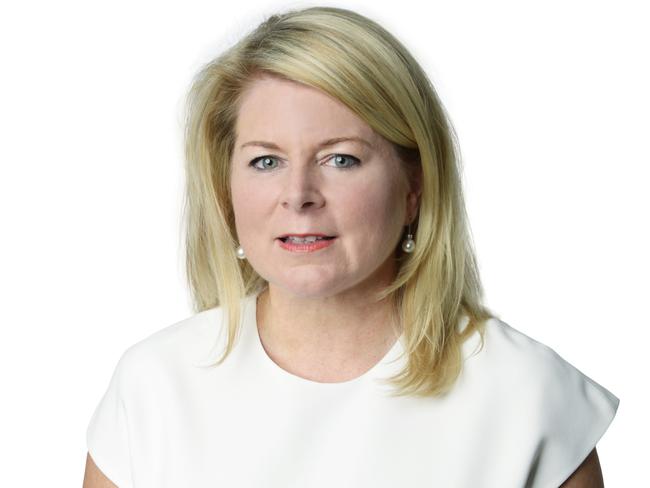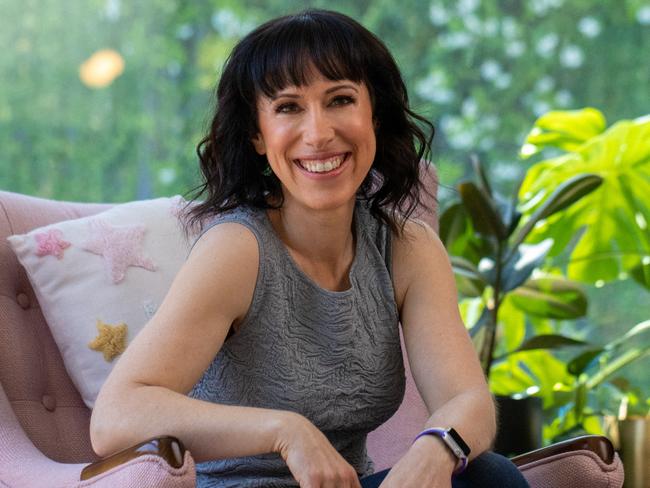Empty offices: Property Council data reveals Covid’s impact on commercial property
Vacancy rates in Australian offices are at a 25-year high due to the move to working from home — and one city has been hardest hit.
Coronavirus
Don't miss out on the headlines from Coronavirus. Followed categories will be added to My News.
Covid is clearing out Australian offices, with vacancy rates at a 25-year high.
A new Property Council of Australia Office Market Report shows 11.9 per cent of office space was empty and unleased nationally in July – a level not experienced since the 1990s.
Lockdowns have put the breaks on rental agreement renewals, prompting owners to
offer incentives including rent-free periods.
Melbourne has been hardest hit by the working-from-home phenomenon, with 120,000sq m of sublease space laying idle – about three times higher than the city’s historical average of 41,000sq m.
The amount of empty office space in Sydney is up 48 per cent on its historical average.
Brisbane has 52 per cent more vacant space, while Adelaide has 82 per cent.

Still, Property Council chief executive Ken Morrison said the report showed “pleasingly solid” demand considering the disruptions of the pandemic.
He attributed much of the empty office space to new commercial property coming on to the market.
“There is quite strong resilience we are seeing across CBDs except Melbourne, which had that extended experience of lockdown,” he said.
“In terms of overall vacancy, it is not too bad.
“Outside Melbourne, demand for office space actually went up.
“(But there are some) markets where a lot of office space comes onto the market.
“There has been this debate since the start of Covid but CBDs are not dead.”
Real estate agency Knight Frank national head of leasing Andrea Roberts said a silver lining of the current market was that businesses could nab a good deal.
Base rents had mostly remained steady but incentives, such a rent-free periods and contributions towards fit-out costs, had increased across the board.
“You are going to get a better deal than you would have in January, 2020,” she said.

Ms Roberts did not know of any large companies choosing not to renew their lease in favour of staff working completely remote, but said some may not be expanding as expected.
She said the effect of hybrid working models, in which workers split their time between the office and working from home, would not be felt in the commercial property market for at least another six months.
“Tenants in a situation where they don’t need the space because people aren’t coming in, they need to make sure they get those numbers right if they want to dump that space,” she said.
“People are not going to make knee-jerk reactions without seeing some data around what this new hybrid workspace is.
“That is being worked through at the moment, but we will see what the outcomes are later, maybe in the next six, 12 or 18 months.”
Some smaller companies have begun to ditch offices, though.
Behavioural science consultancy Inventium and 3D presentation company JigSpace both recently went office-free.
Inventium founder Dr Amantha Imber did not renew her Melbourne and Sydney leases when they came up for renewal in December.
“Given the everyone was really enjoying working from home and most of the team was really thriving not working from an office environment, we thought we would try being a remote-first company,” she said.

JigSpace co-founder Zac Duff said he and his 25-plus employees would eventually move back into an office space, but for now they would be a completely remote team.
“When Covid hit and we went into lockdown, we continued to have the (Melbourne) office lease for four or five months, waiting for things to ease, but push came to shove and we decided to close it down,” he said.
Covid is also effecting employment in the commercial real estate sector.
Recruiter Hays regional director Austin Blackburne said it was not a dying profession, however it was “rapidly changing”.
“Many businesses want to retain CBD headquarters, albeit on a smaller scale with potentially multiple suburban satellite offices,” Mr Blackburne said.
“Leasing agents and commercial property managers are still in demand if they can demonstrate success in relocating or downsizing and managing tenancies.”




